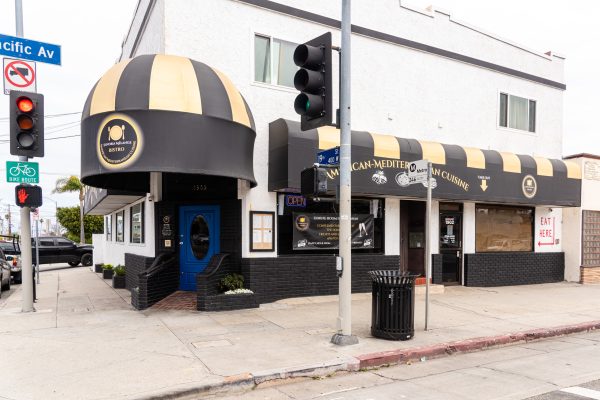
Following an outcry among local businesses, the Hermosa Beach City Council voted to reduce the fee charged for deploying street-front A-frame signs.
The regulations at issue had been approved by the council in May and went into effect in August. They required a $535 one-time application fee and a $90 annual renewal fee for a businesses to use the signs. Tuesday night’s vote reduced the initial amount to $150, a number offered as a compromise by several local retailers.
Councilmembers approved on the reduction 4-1 vote, citing the importance of local businesses to the city’s economic vitality. Mayor Hany Fangary, who had opposed the original ordinance out of concern for the effect of the signs on the city’s streetscape, was the lone no vote.
Listening to comments from owners of local businesses, Councilmember Carolyn Petty strongly favored the reduction, and said she would have been in favor of eliminating the fee entirely. She said that all California businesses already had to deal with an “incredibly anti-business” climate, and that, in the midst of mounting state regulations, fees for A-frame signs were the last thing the area needed.
“Whether it’s mandated sick-time, raising the minimum wage, many won’t make it,” Petty said.
The reductions came as part of a broader consideration of fees that the city charged in association with the performance of some city services. The amounts that cities may charge for such services are governed in part by state law, including Proposition 218.
The city hired a consultant, Revenue and Cost Specialists LLC, to examine how well existing fees were covering costs, including staff time. The city had last examined municipal fees in June 2011. Fees assessed for A-frame signs were among the dozens of costs considered in the study.
During the study, the city was also revising its approach to code enforcement. According to Community Development Director Ken Robertson, A-frame signs were never permitted in Hermosa prior to the May ordinance, but the emphasis on enforcement has varied considerably over the years. The city began “Operation Clean Sweep” several years ago to deal with cluttered sidewalks in the downtown area, then last year made enforcement a lower priority while they deliberated over a new approach to the signs. The May ordinance was designed in partnership with local businesses, but many said they felt blindsided by the fees, particularly the up-front cost.
City staff consistently maintained that the fees in the ordinance were not revenue generators, but were needed to recover costs associated with the signs, including assuring that they do not obstruct sidewalks in violation of the Americans with Disabilities Act. The Revenue and Cost Specialists report matched this conclusion, and actually suggested boosting the upfront fee to $595.
At Tuesday night’s meeting, Finance Director Viki Copeland said that the issue was whether the fee should match the costs imposed on staff.
“The policy decision for the council is whether it should be covered 100 percent, as we think most fees should be, or whether it should be subsidized,” Copeland said.
But many in the community disputed the tabulation of staff time, and were ultimately able to reframe the issue not as one of subsidizing business, but of supporting the community. Lori Ford, owner of Gum Tree on Pier Avenue, emphasized the role played by local businesses, listing more than a dozen of charitable causes to which she and other retailers regularly donated.
“That is how I want to spend my time and resources,” Ford said.
Law firm gets expanded office
Pier Avenue law firm Baker, Burton & Lundy will be expanding into a neighboring space now occupied by a laundromat, and adding a second story with a roof deck.
The firm, which opened its office in 1980, will be taking over a space now occupied by Door to Door Cleaners and Tailors. The remodel had already been approved by the Planning Commission, and would typically have passed through the City Council without discussion. But while both the project and the firm earned plaudits from members of the council and community, council members devoted some discussion to the project because of broader concerns about the changing face of upper Pier Avenue.
Robertson, the community development director, said that the project met all code specifications, but that the “incremental change in use” along the boulevard could eventually require attention by the council. He pointed out that neighboring Manhattan Beach is currently in the process of developing land use regulations to deal with the conversion of street-level space from retail to office use.
But such regulations, Robertson said, are tied up with other issues like coastal parking requirements, and full discussion will have to wait until after the city finalizes its general plan at the end of this year.
Councilmember Jeff Duclos joined the unanimous vote to approve the project, but cautioned that the charming character of downtown’s many small-scale commercial buildings was threatened.
“At this point, there is no concept of historical preservation on that street,” Duclos said.
Baker Burton and Lundy sought the added footprint to provide office space for three recent hires, said partner Albro Lundy.









